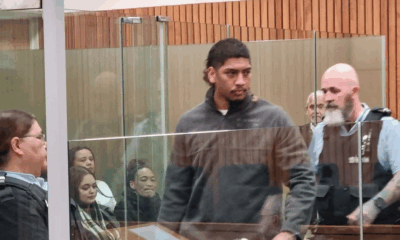World
Comancheros Member Mormon Fa’alogo Loses Appeal in Violence Case

A member of the Comancheros gang, Mormon Fa’alogo, will remain incarcerated after the High Court rejected his appeal against a conviction for violent assault. The court found that Fa’alogo failed to demonstrate his innocence regarding the brutal attack on a woman in May 2023, which resulted in severe injuries, including a collapsed lung.
The High Court described Fa’alogo’s explanation for the victim’s injuries as “patently implausible” and “defies belief.” The ruling underscores the gravity of the case, which has drawn attention not only for its violent nature but also for the unusual circumstances surrounding the victim’s testimony.
Victim’s Testimony Complicates Case
During the trial at the Auckland District Court, the victim attempted to undermine the prosecution’s case. She did not provide evidence for the police during her initial testimony. Instead, she later testified on behalf of the defense, asserting that Fa’alogo was not responsible for the incident. Her testimony was pivotal, as she described sustaining multiple injuries, including a fractured rib, broken eye socket, and extensive bruising that required hospitalization.
Fa’alogo, who took the stand in his own defense, maintained his innocence throughout the proceedings. His legal representative, Julie-Anne Kincade, KC, contended that the district court judge, Nicola Mathers, committed a miscarriage of justice by disregarding the testimonies of the only two witnesses who were present during the incident.
The court’s decision highlights the challenges faced in cases involving domestic violence, especially when the victim’s testimony is inconsistent or contradictory. Prosecutors noted the uniqueness of this case, given the victim’s active role in attempting to derail the charges against Fa’alogo.
Legal Consequences and Community Impact
As Fa’alogo remains incarcerated, the implications of the case extend beyond the courtroom. It raises significant questions about the dynamics of domestic violence and the support systems available for victims. The decision serves as a reminder of the complexities involved in legal proceedings where personal relationships and emotions intertwine with the pursuit of justice.
The High Court’s ruling also reinforces the judiciary’s commitment to addressing violent crime, particularly in a landscape where gang-related activities often lead to severe consequences for victims. The case against Fa’alogo reflects broader societal issues related to violence and the ongoing struggle for victims to seek justice.
As the community continues to grapple with the aftermath of this incident, it is essential to recognize the importance of support for victims and the need for effective measures to combat domestic violence. The legal system’s response to cases like Fa’alogo’s will undoubtedly shape future discussions on accountability and prevention in New Zealand.
-

 Sports2 months ago
Sports2 months agoNetball New Zealand Stands Down Dame Noeline Taurua for Series
-

 Entertainment2 months ago
Entertainment2 months agoTributes Pour In for Lachlan Rofe, Reality Star, Dead at 47
-

 Entertainment4 weeks ago
Entertainment4 weeks agoNew ‘Maverick’ Chaser Joins Beat the Chasers Season Finale
-

 Sports6 days ago
Sports6 days agoEli Katoa Rushed to Hospital After Sideline Incident During Match
-

 Sports2 months ago
Sports2 months agoSilver Ferns Legend Laura Langman Criticizes Team’s Attitude
-

 Politics1 month ago
Politics1 month agoNetball NZ Calls for Respect Amid Dame Taurua’s Standoff
-

 Entertainment2 months ago
Entertainment2 months agoKhloe Kardashian Embraces Innovative Stem Cell Therapy in Mexico
-

 Sports3 days ago
Sports3 days agoJamie Melham Triumphs Over Husband Ben in Melbourne Cup Victory
-

 World3 months ago
World3 months agoPolice Arrest Multiple Individuals During Funeral for Zain Taikato-Fox
-

 Sports3 months ago
Sports3 months agoGaël Monfils Set to Defend ASB Classic Title in January 2026
-

 Entertainment1 month ago
Entertainment1 month agoTyson Fury’s Daughter Venezuela Gets Engaged at Birthday Bash
-

 Sports1 month ago
Sports1 month agoHeather McMahan Steps Down as Ryder Cup Host After Controversy





















